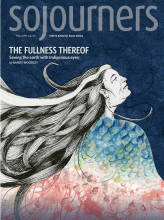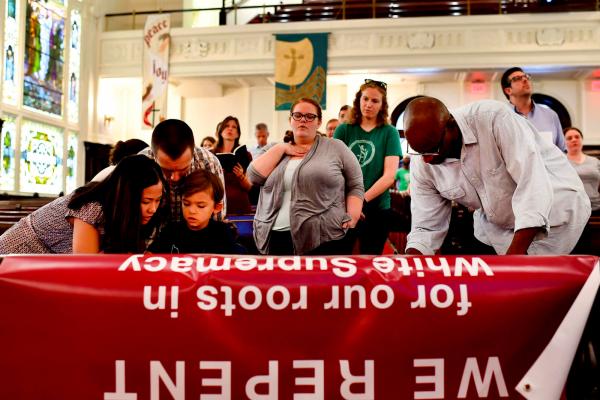FOR A GOOD SIX MONTHS, I didn’t notice the words carved above the grand sanctuary entrance to Mount Vernon Place United Methodist Church in Washington, D.C. The letters stand guard over the doors like sentries: Methodist Episcopal Church, South. The words meant nothing to me.
In February, the General Conference of the UMC voted to strengthen the enforcement of denomination rules against ordaining LGBTQ Christians and performing marriage ceremonies for LGBTQ couples. But Mount Vernon Place (MVP) has long described itself as “young and old, gay and straight, liberal and conservative, housed and unhoused, people filled with faith and people who know doubt.” It struck me as a place I could fit in and be challenged.
On my first visit, I was intrigued by a bulletin notice announcing the launch of a racial-justice book group—especially since the congregation is predominantly white. So I joined.
Book group leader Caroline Anderson-Gray, white and in her 30s, has been a member at MVP for four years. I asked her why she started MVP’s racial justice conversation with a book group.
“In the summer of 2016, as reports of police officers killing black citizens seemed to be at the top of the news every other day, our minister raised the idea of a racial-justice reading group,” said Anderson-Gray. “I believe that to be Christian is to be committed to dismantling structures of hatred and inequality, so a reading group on the subject of racial justice at church made a lot of sense to me. By the time we had our first meeting, the presidential election had occurred, and the need for such a group was more urgent than ever.”
A book group may not seem like much given the rise of social terror. But small discipleship groups are a very Methodist practice—and this one opened a space for transformative conversations. Eight to 12 people, a microcosm of the church, gathered every other month to read and learn. One man, a Canadian expatriate, spoke about his difficulty in understanding his new country considering the experiences of his African-American husband. Una Song, an MVP member for three years, said that reading Patricia Raybon’s My First White Friend helped Song clarify her own experiences of exclusion in a country dominated by white privilege.
Read the Full Article

